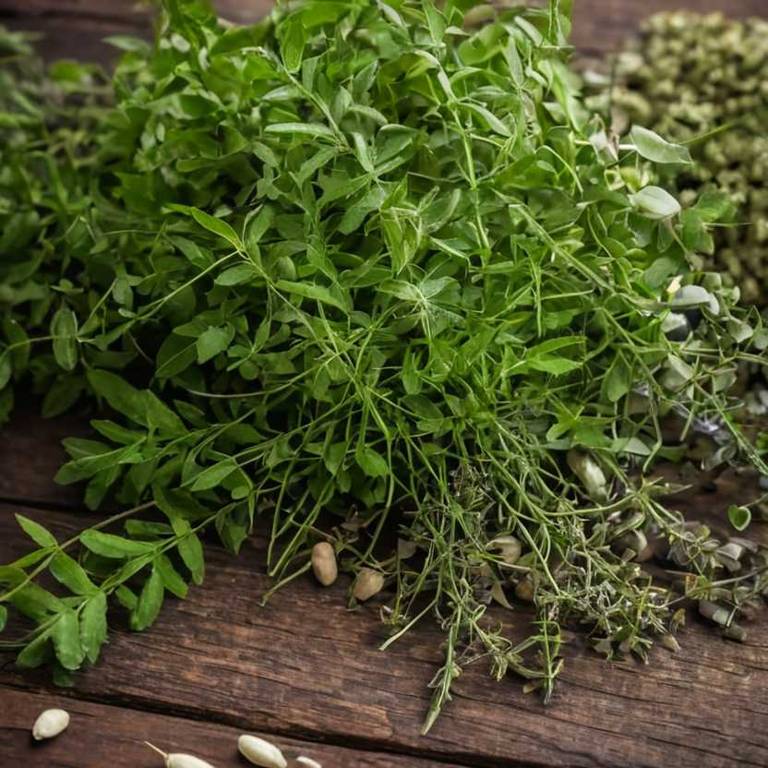False Leaf (Phyllanthus amarus)
False Leaf (Phyllanthus amarus) is a member of the Euphorbiaceae family, native to Africa, South Asia, and Southeast Asia. Traditionally, its leaves, stems, and roots have been used for decoctions, infusions, and powders.
This herb is particularly valued for its anti-inflammatory, diuretic, and bitter actions, and has a long history of use in african traditional medicine, ayurvedic medicine, and traditional chinese medicine.

Quick Facts / Key Information
| Common Name | False Leaf |
|---|---|
| Scientific Name | Phyllanthus amarus |
| Plant Family | Euphorbiaceae |
| Genus | Phyllanthus |
| Species | amarus |
| Native Range | Africa, South Asia, Southeast Asia |
| Plant Parts Used | Leaves, Stems, Roots |
| Primary Medicinal Actions | Anti-Inflammatory, Diuretic, Bitter |
| Primary Traditional Systems | African Traditional Medicine, Ayurvedic Medicine, Traditional Chinese Medicine |
| Historical Preparation Methods | Decoction, Infusion, Powder |
Botanical Identity
- Scientific Name
- Phyllanthus amarus
- Common Name
- False Leaf
- Synonyms / Alternative Names
- Phyllanthus Amarus, Bitterleaf, Crampball
- Plant Family
- Euphorbiaceae
- Genus
- Phyllanthus
Botanical Description
- Growth Habit
- Perennial herbaceous plant.
- Height
- It typically grows to a height of 30 to 100 centimeters.
- Leaves
- Simple leaves with entire margins, upper surface glabrous and dark green, lower surface pale green with distinct stomatal bands.
- Flowers
- Inflorescences are dense clusters of small yellow flowers with five fused petals, actinomorphic symmetry, and prominent yellow stamens.
- Stems
- Erect, branched, with opposite leaves, smooth surface, and nodes bearing stipular scars.
Traditional Uses / Historical Use
Traditional Systems
- African Traditional Medicine
- Ayurvedic Medicine
- Traditional Chinese Medicine
Historical Preparation Methods
- Decoction
- Infusion
- Powder
- Tincture
Medicinal Actions
- Anti-inflammatory
- Commonly referenced as a warming anti-inflammatory, for irritation-related applications.
- Diuretic
- In herbal literature, noted as a gentle diuretic, in urinary system discussions.
- Bitter
- Traditionally described as a cooling bitter, in taste-driven classifications.
- Tonic
- As described in traditional systems, a moderate tonic, for long-term use contexts.
Active Compounds
- Flavonoid
- A group of naturally occurring compounds commonly present in many flowering plants.
- Phenolic Acid
- Simple phenolic molecules widely distributed across plant tissues.
- Tannin
- A class of polyphenolic compounds commonly found in bark, leaves, and seeds.
- Saponin
- A chemical class frequently identified in herbaceous and woody plants.
Modern Research Overview
Modern scientific investigation of this plant has focused on identifying its chemical constituents and examining their properties in controlled research settings. Comprehensive study summaries will be incorporated into this section as additional sources are reviewed.
Safety & Contraindications
- General Precautions
- The use of this herb may warrant general caution in certain situations.
- Contraindications
- Specific contraindications associated with this herb have not been well documented.
- Allergies
- Allergic reactions associated with this herb have not been well documented.
- Drug Interactions
- Available information regarding interactions with pharmaceutical drugs is limited.
- Toxicity
- This herb has been associated with toxic effects under certain conditions.
- Pregnancy & Breastfeeding
- Use during pregnancy or breastfeeding has not been clearly established in available sources.
Preparation & Usage Methods
- Infusion
- A preparation method involving steeping plant material in heated water for a short period.
- Decoction
- Decoctions are made by heating plant material in water for an extended time.
- Poultice
- Poultices involve external application of prepared plant matter.
- Powder
- Plant parts are dried and mechanically reduced to a powdered form.
- Tincture
- Alcohol is used as a solvent to extract plant constituents over time.
Growing, Harvesting & Storage
Growing / Cultivation
- Soil
- Prefers loamy soil with well-drained conditions. Typically grows best in organically rich soils.
- Sunlight
- Thrives in full sun. Tolerates full sun to partial shade.
- Watering
- Prefers well-balanced moisture levels. Tolerates variable moisture levels.
Medical Disclaimer
The information provided on this page is for educational and informational purposes only. It is not intended to diagnose, treat, cure, or prevent any medical condition. Always consult a qualified healthcare professional before using any herb for medicinal purposes.